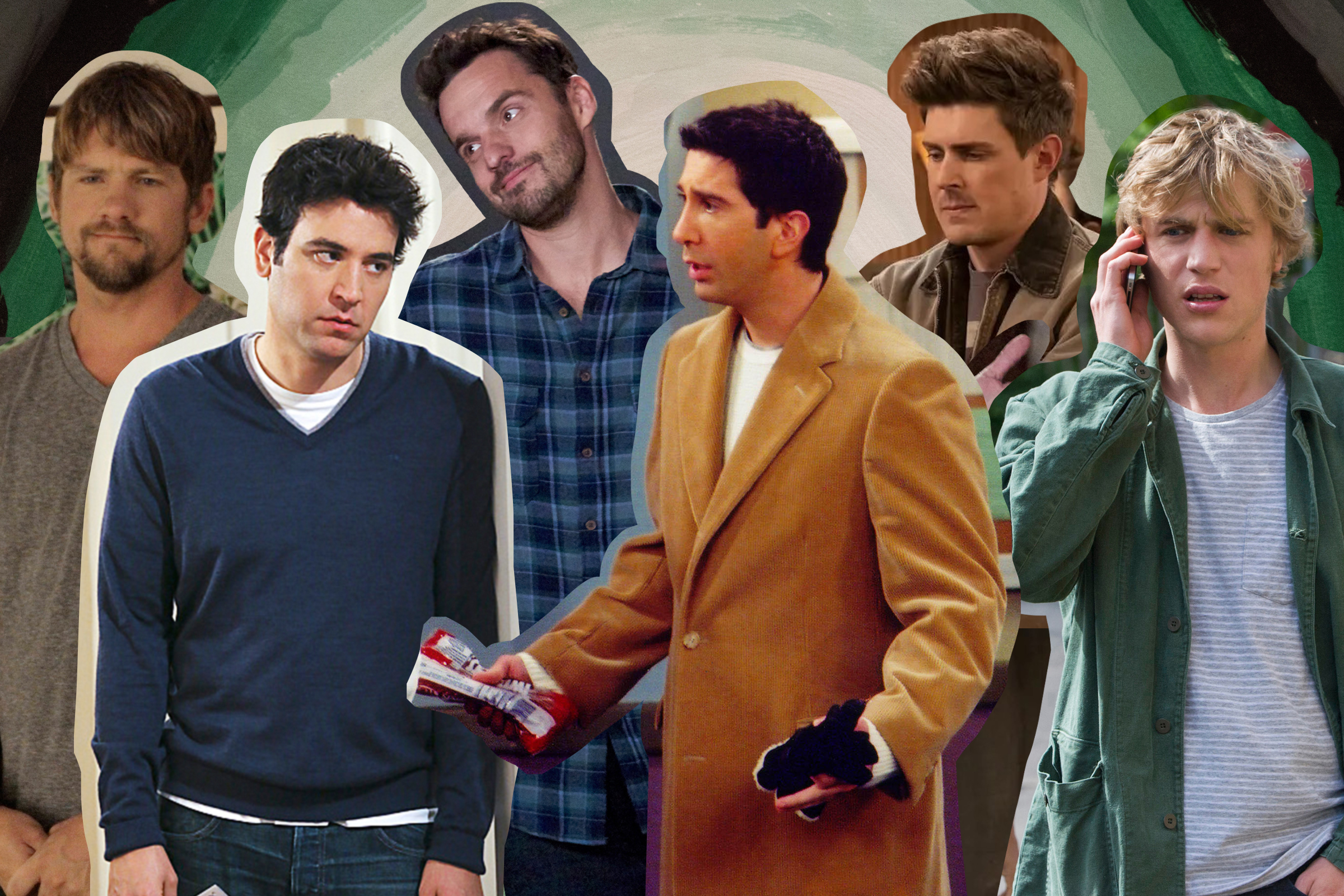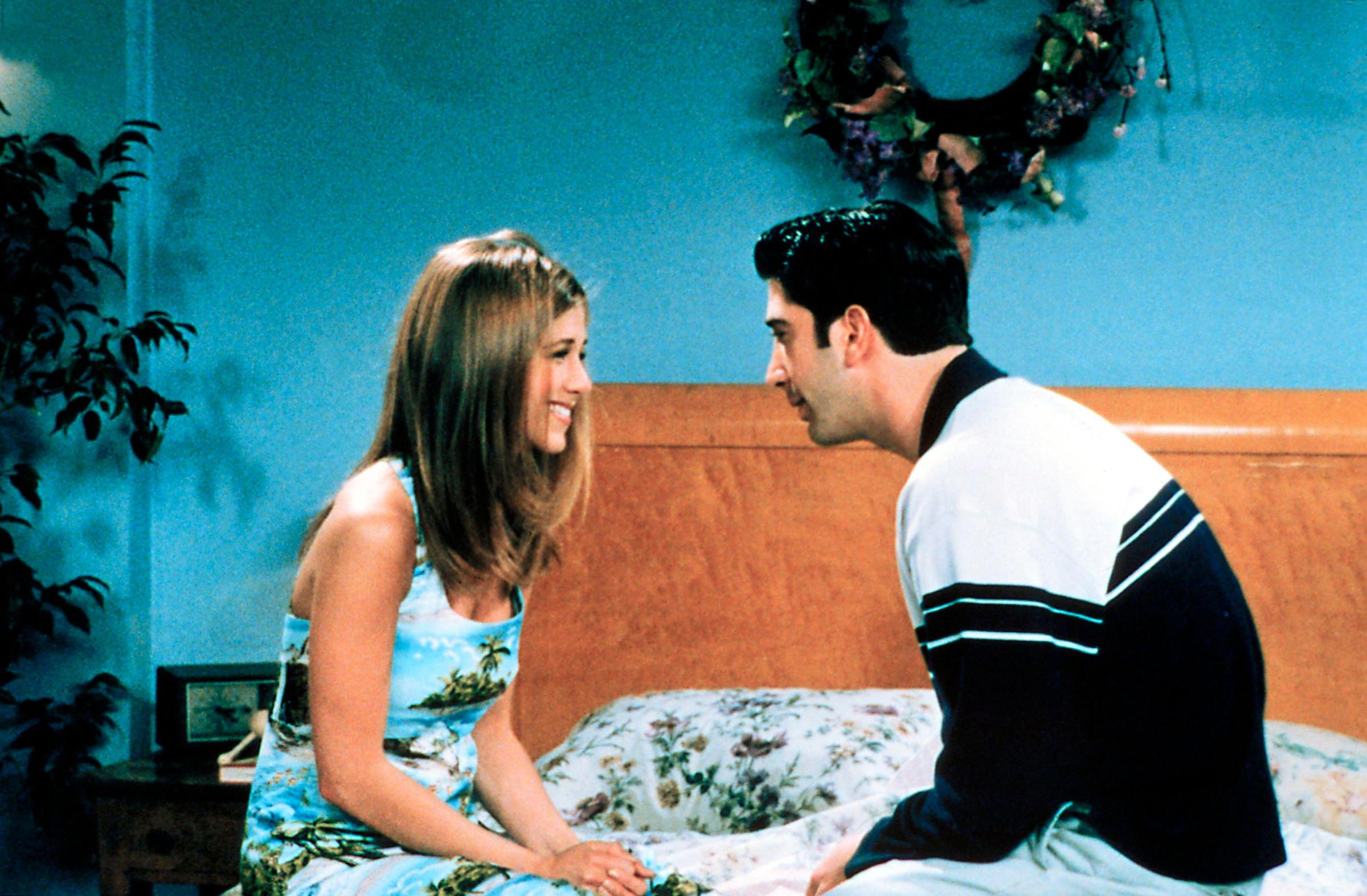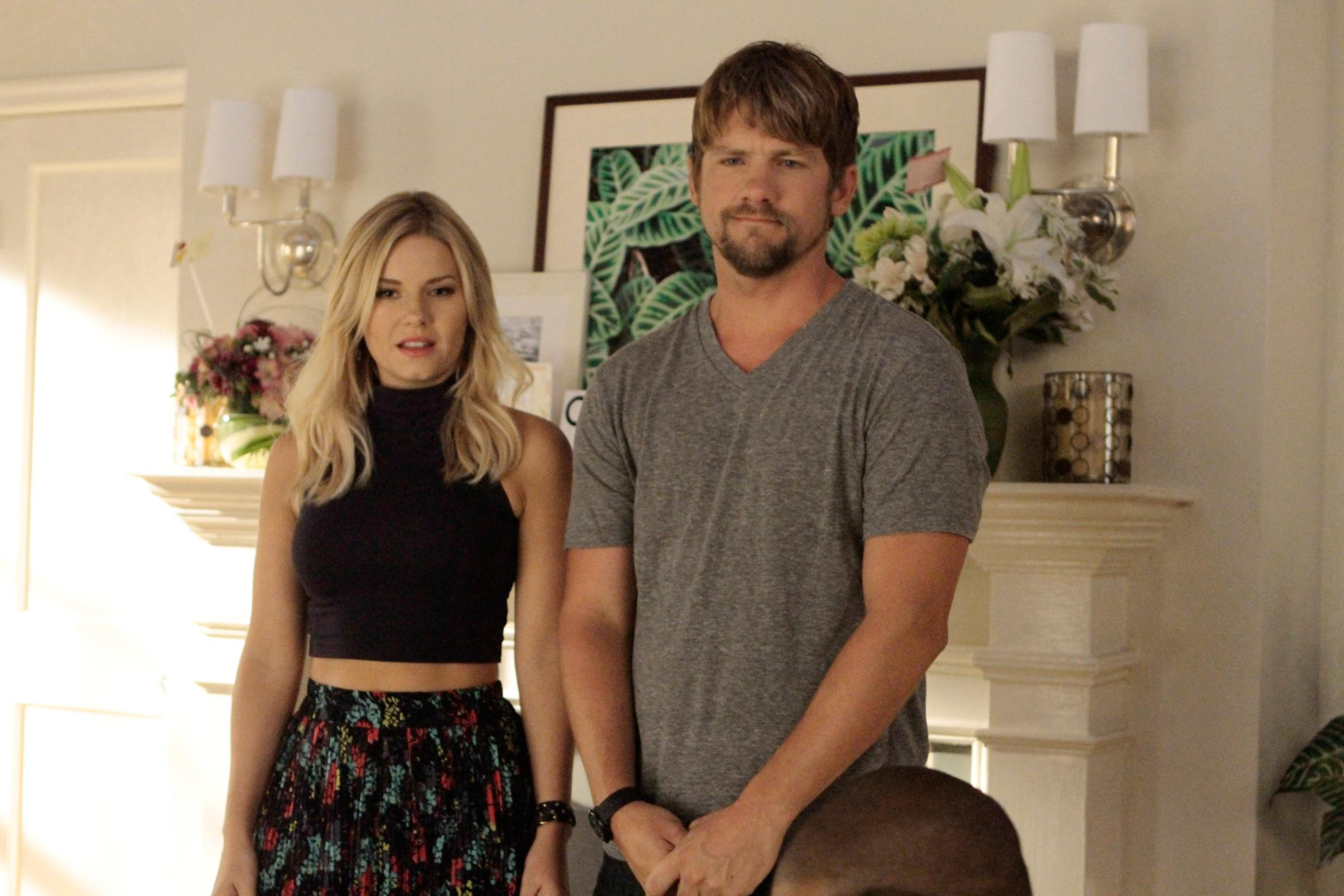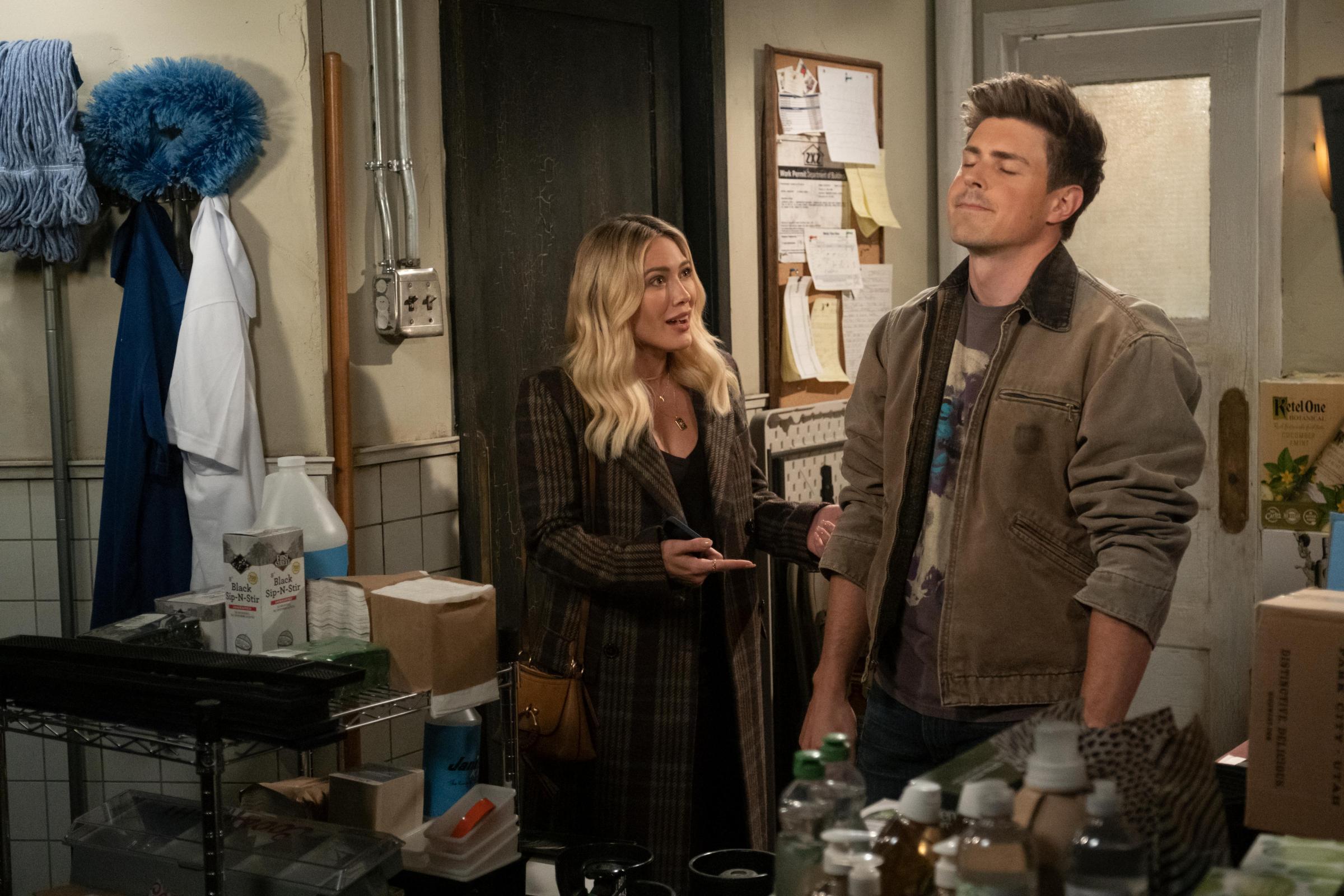
Nobody watched How I Met Your Mother for its protagonist Ted (Josh Radnor). They tuned in for Neil Patrick Harris’ Barney, the quippy playboy, or for the way that Jason Segel’s Marshall and Alyson Hannigan’s Lily doted on one another. Ted was a drip. A bummer. He complained about not being able to find love. Worse still, he seemed to feel entitled to a partner.
Thankfully, the central character in Hulu’s long-awaited How I Met Your Mother spinoff, How I Met Your Father, is not only a woman (Hilary Duff’s Sophie), but a woman who remains unflaggingly optimistic about her prospect of finding love in the big city, even in the face of repeated rejection. And yet, somehow, a whiny Ted-like character has still snuck his way into this new ensemble. Christopher Lowell plays Jesse, Sophie’s new friend—and, based on the puppy-dog looks the two often exchange, inevitable love interest. Jesse reveals in the first episode that he proposed to his girlfriend on stage in front of hundreds of people, but she turned him down. A video of the incident has gone viral, and he has turned bitter. His defining character trait in the first few episodes is “man dumped by woman.”
Jesse is far from the first self-styled good guy to get dumped in the pilot episode of a sitcom. In fact, he’s the inheritor of a dated and sexist trope. He’s the latest in a long legacy of lovelorn men who are a tiresome staple of these ensemble casts. Many of the comedy shows that aired from mid-1990s to the early 2010s fall into one of two categories: hangout comedies that are, essentially, riffs on Friends (How I Met Your Mother, Happy Endings, New Girl) and workplace comedies (The Office, 30 Rock, Parks and Recreation). The workplace comedies were filled with zany personalities, and while some among them may have been mopey (hello, Toby Flenderson), they were supporting players, not romantic heroes. But if the show fell into the former classification, it probably had a Ted in the group.
Read More: 10 Delightful Hangout Shows for People Who Miss Hanging Out
The formula was always the same: In the first episode of the show, a woman humiliates this guy in some public and devastating way, thus engendering the audience’s sympathy. That guy then spends the next several seasons moping and dating. He tends to be so fixated on his own pain that he remains blithely oblivious to the feelings of the women he dates. The audience is supposed to excuse his behavior because of the hurt he suffered, which established him as one of the “good guys” who actually wants to settle down (often in contrast to his lothario friend—think Joey on Friends, in contrast to Ross, or Barney on How I Met Your Mother, juxtaposed with Ted).
Yet despite his good guy status, he usually winds up cheating, lying or dumping the more serious of these girlfriends in pursuit of the “one true love,” a female friend in his 20-something friend group (see: Rachel Green and Robin Scherbatsky). They eventually end up together, and the dude’s faith in love is restored.
In the years since Ted and Ross made their marks on television, comedy writers have—to their credit—riffed on the character type and created more self-aware and evolved versions of this rather irksome romantic lead. But almost every iteration of the hangout comedy has inexplicably clung on to the sad sack. Seeing a Ross-like figure crop up in a 2022 show like How I Met Your Father, 28 years after the debut of Friends, is disheartening. Our cultural obsession with rehashes and reboots has shackled comedy writers to some problematic formulas. Jesse’s mere existence warrants a look back at this toxic trope, as well as a plea to hold our sitcom dudes to higher standards.
Ross on Friends: The ur text

Ross may have once been a genuinely nice guy. But we never get to see that version of him. In the very first episode of Friends, Ross’ wife Carol leaves him for a woman, and it seems to break him. Disturbingly, he appears to be more upset by the challenge to his masculinity than the breakup itself. As many people who rewatched Friends in recent years have observed, Ross is not only homophobic, fretting over what Carol’s sexuality means for the sexuality of the son they share together, he’s outright bitter: He often makes disparaging remarks about Carol and, particularly, her partner Susan.
Ross even develops a rage issue after he is rejected by another woman, his second wife Emily, and has to go to anger management therapy. (It’s worth noting that Emily leaves Ross after he says “I take thee Rachel,” instead of “I take thee Emily” at their wedding. Her decision to end the short-lived marriage is quite understandable. If anyone should be angry about the incident, it’s Emily.)
Throughout all this relationship turmoil, Ross moons after Rachel. Rachel rejects him over and over again before finally relenting. She’s rewarded with a boyfriend who yells at her for prioritizing her career, becomes possessive when he learns of Rachel’s friendship with a male coworker, and then cheats on her. And yet when Rachel dumps Ross after learning of the affair, we as an audience are supposed to be sad. They will, inevitably, end up together, though Ross will mope quite a bit more, especially when Rachel, pregnant with their baby, rejects his advances yet again.
Any casual survey of the Friends fandom will find that Ross is the least loved character, for all the reasons listed above. In each Friends knockoff, certain aspects of the original Friends characters would crop up again and again: A girl next door like Rachel, a quirky friend like Phoebe, a seducer like Joey, a happy couple like Monica and Chandler. But the characters would grow beyond those bounds, evolving into new creations in their own right. Puzzlingly, though, Ross has received a simple copy-paste treatment in so many of these iterations…which brings us to Ted.
Read More: 16 Shows to Watch When You Run Out of Friends and The Office
Ted on How I Met Your Mother: The center of the story

Debuting in 2005, How I Met Your Mother may have been the most obvious Friends copy-cat—just sub out a coffee shop for a bar, and throw in a high-concept voiceover. But it was also arguably the most successful, routinely achieving high ratings and running for nine seasons.
Curiously, How I Met Your Mother chose to center its story on its Ross-like figure, Ted. And while it eventually became a true ensemble show, Ted’s quest to find a wife always drove the plot. True, the central character on a sitcom is often its least-interesting person: Someone had to play the straight man to Neil Patrick Harris’ antics. But with the lovelorn dude’s story taking up the majority of screen time, rather than just 1/6th of every episode as it did on Friends, Ted’s self-pitying became more than just an annoyance. The show was embracing toxic behavior.
In the first episode of How I Met Your Mother, Ted fantasizes about his imaginary wedding to a bride he has yet to meet. He later meets and goes on a date with Robin (Cobie Smulders). When he misses his chance to kiss her at the end of the night, Ted stages a grand, romantic gesture for the woman he just met, stealing a blue French horn for her and telling her he loves her. Robin, understandably, freaks out because “I love you” is an insane thing to say to a person you’ve known for a few hours. Ted makes one last-ditch effort to plead his case as someone who will make a great husband and dad. It still doesn’t happen. For the next nine seasons, he mopes, and we are meant to empathize with his plight.
Ted would often complain to his friends about his single-dom. He actually wanted to get married, unlike Barney. Who were these cold, heartless women who would reject him? Don’t women want to get married to someone who just wanted to treat them well? But upon my rewatch of the show, “nice guy” Ted didn’t strike me as so nice. He broke up with a woman on her birthday—twice—cheated on his long-distance girlfriend and continued to pursue Robin even when she repeatedly told him to stop. Once Robin and Ted did, inevitably, get together, he behaved jealously and repeatedly ignored her desires, asking her, for example, to get rid of her dogs because they reminded him of her exes, while refusing to dispose of his box of mementos from old relationships.
Read More: A Guide to the Most Calming, Anxiety-Free Content You Can Stream Right Now
In the years since How I Met Your Mother went off the air, the jokes have not aged well and many viewers have pointed out that Barney, a character largely defined by his misogyny, was problematic and retrograde. But the show at least poked fun at Barney. The writers made it abundantly clear that the way Barney treated women was wrong, and the character did eventually see the error of his ways. Upon rewatch, Ted’s toxicity proves more insidious because the series fails to interrogate the fact that he feels entitled to a girlfriend and possessive of Robin in particular. The show even conjured up and then killed off a wife for Ted so he could have even more reason to mope and—conveniently—his happy ending with Robin, a move that irked fans even as it was happening. Women were disposable and interchangeable, all for the sake of Ted’s happiness.
Gradual improvements upon the trope

By 2011, sitcom writers lucky enough to get a Friends-like show on the air wisely poked fun at the series that started it all. There’s perhaps no more irreverent hangout sitcom than Happy Endings, a self-conscious show that leaned into absurdity and consistently upended the typical tropes of the genre. At one point, the show’s characters even debate which of them is which Friends character. The Ross equivalent is obviously Dave (Zachary Knighton), the friend left at the altar by his fiancée Alex (Elisha Cuthbert) for a dude who scooted into the ceremony on roller skates. But unlike Friends or How I Met Your Mother before it, Happy Endings doesn’t try to pretend that Dave’s heartbreak is a compelling plot point. In fact, it embraces the fact that Dave, Alex and all their friends are pretty terrible and annoying people: Dave takes up guitar and grows a goatee in his post-breakup phase, and his friends roast him for his self-pity.
New Girl, which premiered the same year, also wisely flipped the script. It’s a woman, Zooey Deschanel’s Jess, who discovers her partner cheating on her at the beginning of the series and is forced to start a new chapter of her life. But instead of spending season after season bemoaning her bad luck—the relationship grieving is condensed into one episode of watching Dirty Dancing on a loop—Jess largely remains hopeful that she will find love. She does, with her roommate Nick (perhaps the closest thing New Girl has to a Ted). Nick is also dumped in the first episode of the series, but his character is defined by his ineptitude rather than his sadness. The two go through the typical will-they-or-won’t-they plot points, accidentally sabotaging their relationships with other people because they’re in love with one another. But, for once, the affection, jealousy and immaturity is mutual. They’re both a mess in their own ways, and eventually they’re a mess together, a refreshing change from the pathetic dude pursuing the seemingly perfect girl.

The show that most directly takes aim at the toxicity of this trope is the brilliant British series Lovesick, where Emma. star Johnny Flynn got his start. The series centers on Flynn’s Dylan, who learns he got an STI and must revisit all his past partners in order to report the news. In doing so, he reviews what went wrong in each relationship and why he’s been unable to find love. In the first episode, Dylan thinks back to the time he got dumped at a friend’s wedding. He was such a pathetic pushover, he even gave up the hotel room he’s splitting with his girlfriend so she can have sex with someone she picked up at the reception, which is such a Ross move.
Each episode recalls Dylan’s relationship with a different ex-lover. And in reflecting on his past romances, it becomes clear to Dylan that, like Ross before him, he has always held a candle for a friend, Evie (Antonia Laura Thomas). As is typical of the genre, Dylan and Evie blow up their own relationships by admitting that they have feelings for one another. But unlike Ross or Ted, Dylan suffers the consequences of his emotional duplicity. In most shows, a betrayed ex would disappear, making way for the main couple’s happily ever after in the final episode. I won’t spoil the series, but Dylan and Evie’s path to one another is not simple or totally celebratory.
Jesse on How I Met Your Father: Let’s put the lovelorn guy to bed

How I Met Your Father feels retro for a show debuting in 2022—and not just because its breathless references to dating apps and ring lights read like the writers’ room was playing zeitgeist bingo. The first few episodes are stuffed with Easter Eggs for fans of the old series. The show even has a laugh track, a corny feature that’s fallen out of favor in the modern comedy landscape.
So I can’t help but approach Jesse, our latest iteration of the dumped dude, with skepticism. He certainly doesn’t seem as bitter or jealous as, say, Ted. Nor as angry as Ross. But, like his predecessors, he’s by far the least interesting part of the ensemble of characters. I found myself longing to learn more about Sophie’s callous roommate, her wealthy British boyfriend or Jesse’s sister, out on the prowl after divorcing her wife. I had little patience for Jesse’s musings on how his ruined proposal proves love is doomed. After a few episodes, Jesse’s character has evolved very little beyond “the bummer.” It takes several episodes for sitcom writers to nail the chemistry in an ensemble cast, and I want more for Jesse than acting as the pessimist to Zoey’s optimist. But, according to decades of television history, opposites attract, so I’m not holding out hope.
It’s high time the writers behind these sitcoms rethink the long-held assumption that being dumped is an interesting or worthy personality trait on which to hang a character. Could a breakup be a relatable form of adversity to drive a storyline or character’s arc toward a more enlightened, fulfilled version of themself? Sure! But for nearly decade shows like New Girl and Lovesick gave us more evolved versions of single characters looking for meaningful relationships. And in the age of male comedy characters like Ron Swanson, Johnny Rose and above all Ted Lasso, all of whom seem to be almost consciously built in rejection of toxic masculinity, it’s time to retire the lovelorn sitcom dude. His love interests deserve it.
More Must-Reads from TIME
- Cybersecurity Experts Are Sounding the Alarm on DOGE
- Meet the 2025 Women of the Year
- The Harsh Truth About Disability Inclusion
- Why Do More Young Adults Have Cancer?
- Colman Domingo Leads With Radical Love
- How to Get Better at Doing Things Alone
- Michelle Zauner Stares Down the Darkness
Write to Eliana Dockterman at eliana.dockterman@time.com